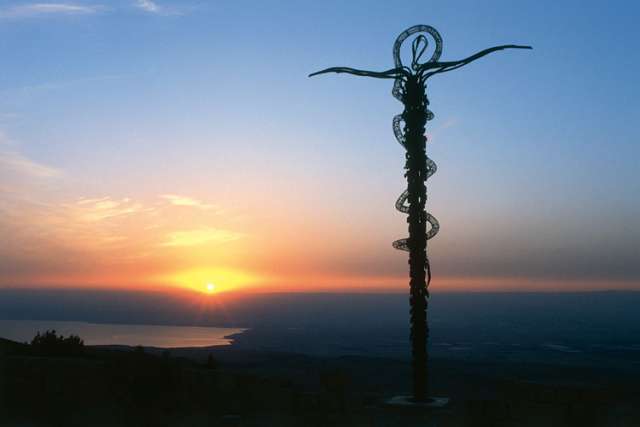Today’s story from Exodus is situated soon after the incident of the Golden Calf, in which the people turned their backs on God and worshipped a god of their own creation. Moses had destroyed the tablets of the Law in his rage against them, and now he was in the process of fashioning a “new edition.” In the story, God finally had a chance to speak for Himself. God’s self-revelation was one of compassion and mercy, patience and faithful, steadfast love. This is the depiction we need to hang on to, for it runs throughout Scripture from Genesis to Revelation. Unfortunately, it is interwoven with many darker images that are the projection of human fear and ignorance.
People often confuse accountability with punishment. In the verses omitted in the reading, God also insisted that although He forgives sin and iniquity, the consequences are often visited on people for generations — no divine punishment needed. God’s self-disclosure was enough for Moses — bowing low, he begged God to accept the people as His own and journey with them. This was despite their weaknesses and failures, which are a mirror of our own. Being a stiff-necked people meant that they were stubborn and prone to do things their own way rather than God’s. That is a good description of humanity in general rather than the unique sin of a particular people. The prayer of Moses was definitely heard, for the gracious God of compassion and mercy continues to journey by our side. We can show gratitude through fidelity and by cleansing our minds and hearts of unworthy perceptions of God.
The short final blessing that Paul used to conclude the second letter to the Corinthians could almost be seen as a standard throwaway line. If we look carefully, it contains some good advice. He admonished the contentious Corinthians to live in harmony and peace, then the God of love and peace would be with them. The divine presence depended on the collective attitude of the community. God cannot dwell in a community in which quarrelling, factionalism, hatred and unforgiveness reign. If we want to experience God in our midst, we need to create the conditions that make it possible.
The Gospel of John also focused on the nature and qualities of God. John 3:16 is often seen in the stands at football games and has taken on the characteristics of a slogan or formula for “being saved.” It is far more than that — it contains a profound challenge to our attitudes and behaviour. Jesus made it very clear to Nicodemus that God’s love for the world and humanity was so intense and unwavering that He gave His only begotten son for the sake of our salvation. Jesus was the lifeline sent by God to save us from ourselves and to enable us to experience the divine life eternally. There was no question of condemnation or punishment. Those who refused the message, even its essence, have already condemned or deprived themselves.
When love is spurned it leaves emptiness, despair and loneliness — and that is a good definition of condemnation. But if we truly believe it, then we can no longer hate others regardless of who they are or what they have allegedly done. Hating, excluding or demonizing those who are different is out of the question. Exploiting and destroying the creation must cease and be replaced with respect and care. To hate, mistreat or harm anything that God has loved so intensely and given so much to save is a form of turning away from God. Look around at the world in all of its beauty and ugliness, pain and joy — God loves it and has saved it, and we must too.

